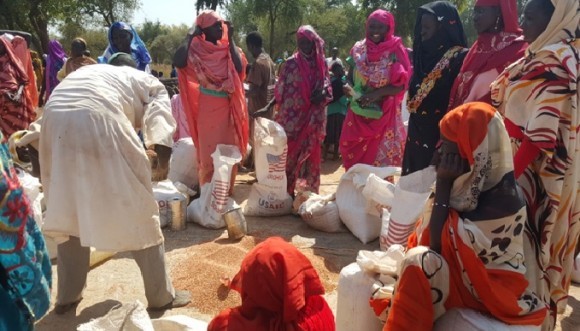Fighting food insecurity in South Sudan
In South Sudan, conflict, insecurity, displacements, access problems and the effects of climate change have led to food insecurity for some 3.9 million people. In the State of Unity (in the north of the country), which is particularly fragile and vulnerable, agriculture is severely compromised due to drought and lack of access to water, and suffered famine in 2017.

Humanitarian access has been extremely limited by insecurity, making it difficult to conduct general food distributions in many highly food insecure areas, particularly in Leer.
ACTED addresses the dire food security needs of displaced populations through emergency food distributions within internally displaced and refugee camps. ACTED also works to improve the resilience of vulnerable people across the country through seed, vegetable and fishing kits and tool distributions
Puoch, Food security and livelihood officer, South Sudan
What inspired you to get into aid work?
My skills and knowledge in food security and livelihood encouraged me into aid work as Akobo has a long history of food insecurity. ACTED started implementing food security projects in the county, and I felt it was the right time for me to deliver my service to the community through a humanitarian organisation.
What is your favorite thing about working with ACTED?
Engagement with communities and beneficiaries is my favorite thing about working with ACTED, maintaining working relationship with all stakeholders of the projects, implementers, beneficiaries and authorities. This paves the way for the sustainability of our projects.
What was your most “rewarding moment” on the job?
Working directly with beneficiaries while seeing the outcome of my efforts is the most rewarding thing to me. When our team introduced kitchen gardens in Akobo in 2014, it was a very unique thing to the beneficiaries. Today not only beneficiaries but the entire population of Akobo county practice kitchen gardening for vegetable growing, both in rainy and dry seasons, with the help of the Akobo river.
What are the main challenges you face as a humanitarian today?
Inaccessibility to other vulnerable communities due to poor weather conditions as Akobo is one of the hard-to-reach regions in South Sudan. In addition, most people are still dependent on relief assistance though there is a transition from dependency to lasting food security in the county.
Kitchen garden project
ACTED is the first humanitarian agency to have introduced a kitchen garden project. The whole of Akobo East applies skills and knowledge of kitchen garden techniques, with the majority of the population growing vegetables both during the dry and rainy season, which is a pretty good indicator of the learning that has been done.
Community is contented by the grouping of people to work together something not existing before ACTED distributed vegetable kits consisting of seeds such as okra, sukuma, onions and tomatoes which they grow in their gardens.